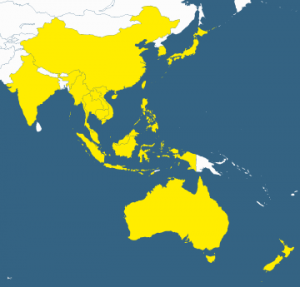This week, the 16 Asian and Pacific countries negotiating the Regional Comprehensive Economic Partnership (RCEP) are meeting in Thailand. This trade agreement will include Australia, Brunei, Cambodia, China, India, Indonesia, Laos, Malaysia, Myanmar, New Zealand, Japan, the Philippines, Singapore, South Korea, Thailand, and Vietnam. According to the RCEP’s Guiding Principles stated at the beginning of the negotiations in 2012, the agreement will include an intellectual property chapter to promote “cooperation in the utilization, protection and enforcement” of IPR.
Japan’s proposed intellectual property text, which was leaked and has been posted online by KEI, includes numerous TRIPS Plus provisions. (South Korea is reported to be advocating for TRIPS-Plus provisions too.) Many of the provisions would be especially harmful to the Indian generic industry, which supplies the majority of medicines used by people in developing countries.
Here are some of the provisions from the leaked Japanese proposal:
- Scope of patentable subject matter
Article XX.C.1.2. Each Party shall ensure that a claimed invention is not excluded from the patentable subject matter solely on the ground that the invention is a new form of a known substance which does not result in the enhancement of the known efficacy of that substance or that the invention is a new use for a known substance.
This is a pretty clear attack on Section 3(d) of India’s patent law, which states that patentable subject matter does not include “the mere discovery of a new form of a known substance which does not result in the enhancement of the known efficacy of that substance or the mere discovery of any new property or new use for a known substance…” The restriction on patentable subject matter in Section 3(d) has allowed Indian generic producers to manufacture low cost versions some very important drugs. It was challenged in the domestic courts by Novartis, but the Supreme Court upheld it.
This article would also widen the scope of patentable subject matter beyond TRIPS to mandate new uses – a provisions that has reportedly been negotiated out of earlier drafts of the Trans Pacific Partnership text.
- Seizure of goods in transit
Article XX.H.1.2. Each Party shall adopt or maintain procedures with respect to suspect goods in transit or in other situations where the suspect goods are under customs control under which its customs authorities may act upon their own initiative to suspend the release of, or to detain, suspect goods.
Its notable that seizures of generic medicines in transit have already resulted in a trade dispute. Indian medicines en route to Brazil and other developing countries had been seized by European custom agents, even though the medicines did not violate IP laws in either India or the countries to which the medicines were destined. The goods only infringed IPRs in the countries through which they were being shipped – and the goods were not intended for markets there. India formally requested consultations at the WTO (the first step in the process of a formal WTO dispute), and the EU ended up changing its policy on seizures of transshipped goods. But this Japanese proposal threatens the same sort of situation.
- Six year term of data exclusivity
Article XX.G.3.1. Each Party shall prevent applicants for marketing approval for pharmaceutical products which utilize new chemical entities from relying on or from referring to test or other data submitted to its competent authority by the first applicant for a certain period of time counted from the date of approval of that application. As of the date of entry into force of this Agreement, such period of time is stipulated as being no less than six years by the relevant laws of each Party.
This six year term of data exclusivity for pharmaceuticals would exceed the five year term typically included in FTAs with the United States. There is no requirement for data exclusivity in TRIPS.
- Patent extensions
Article XX.C.1.5. With respect to the patent which is granted for an invention related to pharmaceutical products, each Party shall, subject to the terms and conditions of its applicable laws and regulations, provide for a compensatory term of protection for any period during which the patented invention cannot be worked due to marketing approval.
This provision, typical of US FTAs, requires term extensions beyond the 20 year minimum required by TRIPS.
These are just four of the provisions in the 36-page Japanese proposal. The complete proposal is available here. It ought to be noted that the proposal is dated last October, and it may have changed since then. The proposal also includes provisions on copyright, industrial designs, civil enforcement, criminal enforcement, and enforcement in the digital environment.
Civil Society Statements:
Vikas Ahuja, Delhi Network of Positive People (Full Statement) – “We are extremely worried; people living with HIV across the world are benefiting from low cost, quality medicines supplied by generic companies in India. Japan is attacking this lifeline by pushing for harmful IP provisions in FTA negotiations with India. We call on the Indian government to stand firm against inclusion of such provisions in the any trade agreement that could shut down India as the ‘pharmacy of the developing world’.”
Shiba Phurailatpam, Asia Pacific Network of people living with HIV and AIDS, (Full Statement) – “We are extremely alarmed at reports that in the RCEP negotiations Japan and South Korea are demanding intellectual property protections from the developing countries of ASEAN and from India and China beyond that required by the World Trade Organisation (WTO). Across the region our members and networks rely on affordable generic medicines for their treatment. With only one in three people in the Asia-Pacific on HIV treatment, any provisions that hamper generic production and supply of affordable medicines will be a direct threat to the lives and health of millions in the region.”





